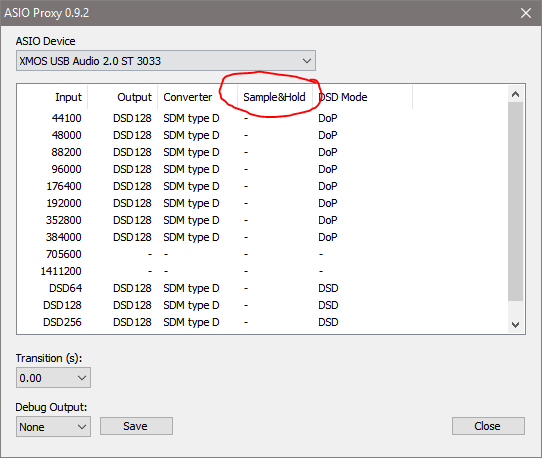
Void sampleRateChanged(ASIOSampleRate sRate)

= kSystemTimeValid | kSamplePositionValid īufferSwitchTimeInfo(&timeInfo, index, processNow) If (ASIOGetSamplePosition(&, &) = ASE_OK) though it will only set the timeInfo.samplePosition and timeInfo.systemTime fields and the according flags as this is a "back door" into the bufferSwitchTimeInfo a timeInfo needs to be created Void bufferSwitch(long index, ASIOBool processNow) Long buffSize = asioDriverInfo.preferredSize įor (int i = 0 i = asioDriverInfo.sampleRate * TEST_RUN_TIME) // roughly measured Sprintf(tmp, "diff: %d / %d ms / %d ms / %d samples \n", asioDriverInfo.sysRefTime - (long)(asioDriverInfo.nanoSeconds / 1000000.0), asioDriverInfo.sysRefTime, (long)(asioDriverInfo.nanoSeconds / 1000000.0), (long)(asioDriverInfo.samples - last_samples))
Asio foobar2000 driver#
tells you the time when driver got its interrupt and the delay until the app receives
Asio foobar2000 windows#
a few debug messages for the Windows device driver developer If (timeInfo->timeInfo.flags & kSamplePositionValid)ĪsioDriverInfo.samples = ASIO64toDouble(timeInfo->timeInfo.samplePosition) ĪsioDriverInfo.tcSamples = ASIO64toDouble(timeInfo->timeCode.timeCodeSamples) ĪsioDriverInfo.sysRefTime = get_sys_reference_time() If (timeInfo->timeInfo.flags & kSystemTimeValid)ĪsioDriverInfo.nanoSeconds = ASIO64toDouble(timeInfo->timeInfo.systemTime) synchronization to other media is required get the time stamp of the buffer, not necessary if no Beware that this is normally in a seperate thread, hence be sure that you take care #define ASIO64toDouble(a) ((a).lo + (a).hi * twoRaisedTo32)ĪSIOTime *bufferSwitchTimeInfo(ASIOTime *timeInfo, long index, ASIOBool processNow)
Asio foobar2000 64 Bit#
conversion from 64 bit ASIOSample/ASIOTimeStamp to double floatĬonst double twoRaisedTo32 = 4294967296. Printf("ASIOOutputReady() - %s\n", asioDriverInfo->postOutput ? "Supported" : "Not supported") (can be used by the driver to reduce output latency by one block) check wether the driver requires the ASIOOutputReady() optimization If (ASIOSetSampleRate(SAMPLERATE) = ASE_OK) Usually you should check beforehand, that the selected sample rate is valid Driver does not store it's internal sample rate, so set it to a know one. If (ASIOCanSampleRate(SAMPLERATE) = ASE_OK) Printf("ASIOGetSampleRate (sampleRate: %f) \n", asioDriverInfo->sampleRate) If (ASIOGetSampleRate(&asioDriverInfo->sampleRate) = ASE_OK) get the currently selected sample rate Printf("ASIOGetBufferSize (min: %d, max: %d, preferred: %d, granularity: %d) \n",ĪsioDriverInfo->minSize, asioDriverInfo->maxSize,ĪsioDriverInfo->preferredSize, asioDriverInfo->granularity) If (ASIOGetBufferSize(&asioDriverInfo->minSize, &asioDriverInfo->maxSize, &asioDriverInfo->preferredSize, &asioDriverInfo->granularity) = ASE_OK) Printf("ASIOGetChannels (inputs: %d, outputs: %d) \n", asioDriverInfo->inputChannels, asioDriverInfo->outputChannels) If (ASIOGetChannels(&asioDriverInfo->inputChannels, &asioDriverInfo->outputChannels) = ASE_OK) If (ASE_SUCCESS != ASIOFuture(kAsioSetIoFormat, &NeedThis)) collect the informational data of the driverĪSIOIoFormat NeedThis = long init_asio_static_data(DriverInfo *asioDriverInfo)

To switch to DSD format mode, I refer to the ASIO SDK documentation and use the ASIOFuture function to do the switching. My sound card supports DSD ASIO Playback. Unfortunately, when switching to DSD sample format, I get a heap corruption error. So far, I am able to play PCM based data successfully. I have used the hostsample example in the documentation.

It may be my imagination but when I used DSD: WASAPI in event mode the output audio seemed a little harsher than using 0.8.4 and the ASIO proxy.I'm trying to use the ASIO SDK v2.3 to create a Windows Console DSD audio player. To get smooth playback with “DSD : WASAPI (event)” as my output I had to change the WASAPI hardware buffer sizes to 1000 MS in the preferences/advanced/playback/WASAPI/Hardware buffer in … mode This is probably specific to my setup. The preferences/tools/SACD is the same as it was (well it has a new option.) Selecting “DSD : ASIO : PS Audio USB Driver” as your output should act like using “ASIO : foo_dsd_asio” but you don’t need that ASIO proxy anymore. With it there’s a bigger list of possible output methods in preferences/playback/output/device, the ones with DSD at their beginnings do DoP when DSD is being played. In 0.9.9, and forward the bugs from the earlier 0.9.x versions with editing metadata not persisting and with waveform seekbar getting too short of results have been fixed. There’s a new foo_input_sacd at - 0.9.x that can do DoP over WASAPI, DS, etc.


 0 kommentar(er)
0 kommentar(er)
